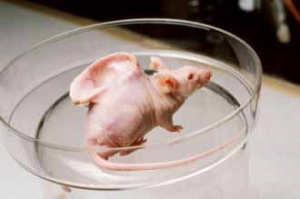Every single time in SC200 when we need to figure out a way to test whether smoking is bad or whether worms make kids stupid, it is unethical to intentionally put humans’ in harm’s way. But it is ethical to test chemicals and other factors on lab rats. I’m not an animal(aka rat) conservationist, but I find it interesting to what the positives and negatives are of using the lab rats. Why are rats used and not another animal?
Rats are considered to have similar genetic structure and cost-efficient to be used as the guinea pigs, or the lab rats. 95% of all animals used in research are rats because their genetic, biological and behavioral characteristics are so similar to that of humans. Rats are also easy to study because the majority of rats are purebred, containing the same genes, except the sex genes. There is a gene called transgenic mice which contains genes that carry human diseases. One of the greatest things about rats to scientists is that they reproduce in large quantities and their lifespan is so short it doesn’t matter if they die a little bit earlier. But the scientists know that there are always more rats to test. Buying the large quantities of rats also makes the usage of rats inexpensive to the researchers. Because rats are used so often in research, their anatomy is well-known to the scientists and makes it a lot easier to keep using the rats. In the pro-animal experiments’ defense, using the rats is not harming humans and developing huge steps in health, making people much healthier and coming up with cures to diseases. Why Rats are used. Scientists are easily able to mutate or crossbreed diseases in the anatomy of the rat since their genetic makeup is so comparable to the human body. Along with that, rats are the only mammals that can have pre-selected genes to manipulate, called Knockout Mice. Overall, rats seem to be the perfect model organism for research, but there are other methods and reasons why they should not be. Human Genome.
People that are against animal experimentation state that it is inhumane and cruel. Also, with our society becoming more technologically advanced, scientists are able to come up with other alternatives to test different diseases and still get the same results without harming animals. PETA cites three different alternatives that are effective: In Vitro testing, computer modeling and human volunteers. Some may say that using human volunteers is unethical, but in this case a method called microdosing allows scientists to see whether a drug is safe or not. In terms of using it on humans, they are only given a small dose of it which does not make it harmful. But even with that small dose, scientists are still able to see its effects. Along with the advancement in technology, scientists have come up with a brain imaging screen that studies the human brain down to a neuron and does not damage their brain at all. The other methods for finding cures is by using the In Vitro testing. This testing uses human cells and tissues to crack down on the disease without actually harming the person directly, but taking a sampling of their cells. The last method uses a computer modeling system which researchers are able to simulate similar human biological structures and progression of human diseases. PETA
All of these methods are ethical, moral and do not use animals.
What this argument comes down to is how much scientists are willing to spend on experimentation, basic beliefs about using animals for experimentation and whether the methods are useful. I’m not going to tell you what is right, but it is up to you to decide.


I have also wondered the same question because in every science class I have taken, almost every experiment was tested on rats. After reading this post I understand why they use rats, but I still don’t think that it is 100% justifiable for every experiment. I think that if scientists can conduct an experiment without having to harm living creatures, they should. Here is a video of rats going through a maze. https://www.youtube.com/watch?v=Ma8HCM3Z5Ic